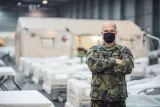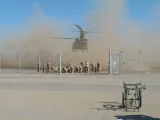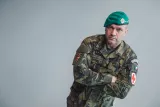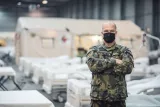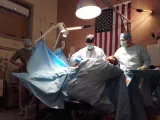Published: 04.01.2023
His territory is an operating theatre in a war zone. Karel Odložilík, an OT nurse in the army and a Faculty of Health Studies graduate, has experienced base attacks, and many wounded and losses on eight foreign missions – memories that will remain with him for the rest of his life. But he made friends and gained valuable experience.
What is the job of a perioperative or OT nurse?
A perioperative nurse works in the operating theatre and cares for the patient before, during and after surgery. Before the operation, together with the porter and the anaesthetic nurse, the OT nurse receives the patient and checks the name, date of birth, type of operation and, if necessary, the side to be operated on. He then makes a mark on the correct side with a permanent marker. He also checks the allergy history. During the operation, the nurse is either a surgical technologist who assists the operating group or a so-called circulating nurse who unpacks the sterile material and is the liaison between the sterile group and the surrounding area. At the end of the procedure, he transports the patient to the recovery room or intensive care unit.
You're a perioperative nurse in the army. What was your first mission?
The first mission is, of course, unforgettable. It was 20 years ago. In the autumn of 2002, I landed at the airport in Kabul, Afghanistan, and found myself in a completely different world. As I was transported from the airport to our base, where the field hospital was located, I observed the locals, the Afghan architecture, and the wildness of the traffic. It was impressive and very different from what we are used to.
Were you in any danger there?
Because we also provided humanitarian care in our field hospital, we had no shortage of work, and we were quite popular with the locals, which was very convenient from a security point of view. During the three months I spent there, there wasn’t a single attack on our base, so we felt safe there.
Did you ever experience an attack on the base on other missions?
There were some attacks from time to time, but fortunately, nothing terrible happened. When nothing happens, you don't see it as dramatic. You accept it as part of the job, and you have to get over it, trying not to let it derail you.
You have to keep cool and calm in the operating theatre. How do you detach from what's going on around you?
Every OT nurse has to deal with stressful situations and work under pressure in the operation theatre at a regular hospital, so I was prepared for this. I didn't see a fundamental difference there. Moreover, a field hospital is usually located at the back, where the danger is not as enormous as when leaving the base.
What does it take for a perioperative nurse to go on a mission?
In addition to adequate education, one of the prerequisites is physical fitness and knowledge of the English language. Another requirement is good health and mental resilience. Every soldier must undergo a thorough medical examination and psychological testing before deployment. The whole group goes through an intensive and comprehensive training before departure, tailored to the place of deployment. It is adapted to the location to which they are going, the nationalities that live there, and also, for example, geographical conditions or epidemiological situations.
How many missions have you been on?
I have taken part in eight foreign operations. The first time I went, I was stressed and imagined all the things that could happen. When I was about to go for the eighth time, I realised that I perceived the missions as less dangerous. I've been through enough, so few things surprise me. But it always depends on where we operate, the security of the base, and the local political situation.
What is your strongest positive and negative experience from a mission?
When I was leaving for my first mission, my colleague told me something I will not forget: "Charlie, you make friends for life on a mission." I can confirm that. The mission experience is intense, and you get to know people much more because you spend 24 hours a day with them. So, considering the positive, it's the new contacts and friendships I made there. As for the negative experiences, we often dealt with serious injuries, and saving lives in the operating theatre was very emotional and dramatic. You never forget that.
What is the ratio of women to men in this physically and mentally demanding profession?
In this case, the numbers are no different from civilian health care, where non-medical health care staff are primarily women. It is the same in the army. Women also have to manage dangerous missions simply because there are not many male nurses. At our 6th Field Hospital, about 60% are women, and 40% are men.
What is a typical day like for an OT nurse on a mission?
A typical day is similar to that of a standard perioperative nurse in a Czech hospital. Even after managing the scheduled surgeries for a particular day, the team must always be on call. If necessary, we have to run to the workplace immediately and be able to operate on acute cases. A specific feature is the mass admission of the wounded, in which the entire hospital is immediately activated. All workplaces must be ready to receive large numbers of wounded within a predetermined time limit. So even when we're off duty, we must be on the radio 24/7.
And what's your day like after you get back from your mission?
After returning from a mission, we work in internship facilities, which are also civilian hospitals. I work in the orthopaedic and trauma wards of the hospital in Přerov, where there is always much to do. Especially now, after the pandemic, when waiting times have increased and we're behind with operations. My day starts with discussing who will do what over the surgery plan for the day. The surgery schedule is followed by cleaning, restocking the OTs, and ordering materials we’ve used. We then prepare the theatres for the next day's surgery, and the serving team awaits any acute operations. On top of that, we still meet the schedule of the day. For example, we sterilise materials, prepare disinfectants, or provide transport of biological material.
You also served in a field hospital for Covid patients. What was your role there?
I served as the senior nurse of this backup facility and was there as a specialist for the non-medical staff. We prepared a field hospital for 500 patients within a few days. They were going to be placed there when the capacity in conventional medical facilities had been exhausted. We were prepared for patients that were no longer in critical condition and those with a milder course. Fortunately, the hospital didn't have to be used in the end.
What did the field hospital look like?
There were huge, heated halls at the Prague Exhibition Centre, where we created several sectors of 50 beds each with mobile screens. The halls were connected by filters with facilities for all the staff.
Can a field hospital be equipped to meet the standards we know from a conventional hospital?
It all depends on the place of deployment: whether you build the hospital in tents or brick buildings, and whether there is heat, light, water, waste pipes, electricity, etc. It's challenging to ensure hygienic epidemiological standards in such improvised conditions. We can never come close to conventional brick buildings, where there is filtering equipment, entrance filters in which the operational group changes clothes, and so on. As far as the equipment and materials are concerned, it is already the same as in a regular hospital. But we were part of an international hospital with the British, for example, where there were tents, and a soldier would come in his uniform, wash his hands, throw on his surgical gown, and go into the operating theatre. In short, it always depends on what's available.
After 20 years of service, you're going to leave the army. Why the change?
The reasons are purely personal. Our Military Medical Agency is located in Hradec Králové, and I live near Olomouc. As a soldier, I spend a lot of time away from home, which I want to change. I want to be at home with my family more. It's time for me to prioritise them.
And will you keep your job?
I'm returning to the operating theatres at the hospital in Přerov, where I started 25 years ago and where I still come to help. I know all the staff. It is a place that is not foreign to me, and the work is close to my heart.
Let's go back in time. Why did you attend the Faculty of Health Studies all those years ago?
When I was studying, the University of Pardubice was the only one offering a master's degree in perioperative care. Moreover, I had positive reviews from my niece, who had previously studied perioperative care in Pardubice.
How do you remember your studies?
I remember it fondly. I expanded my knowledge and skills, but also my contacts. I met many inspiring professionals, and even after 25 years of practice in operating theatres, the study was still beneficial for me. I also appreciated the lectures on management and statistics, which I now draw on in my position as senior nurse with a team of 60 people under me.
The Faculty of Health Studies invests in professional equipment and has acquired, for example, a laboratory that simulates an operating theatre…
That's excellent news because I know from experience that practical teaching of perioperative care is the most beneficial. Not only do you see what it looks like in the operating theatre, but you can imitate and practise various activities. Students can also see the instruments and devices, which gives them more than just a picture in a book.
Profile:
Mgr. Karel Odložilík (1975)
- In 2011, he graduated from Vysoká škola zdravotníctva a sociálnej práce sv. Alžbety (St. Elizabeth College of Health and Social Work) in Bratislava.
- He completed his master's degree in perioperative care at the Faculty of Health Studies of UPCE, where he graduated in 2020.
- He has more than 25 years’ experience from operating theatres in civilian and military hospitals.
- He has been on eight overseas missions as a perioperative nurse in the army.
- He served as a senior nurse at the Letňany field hospital for 500 coronavirus patients.
- He enjoys spending his free time with his family, in the garden or riding his bike.

